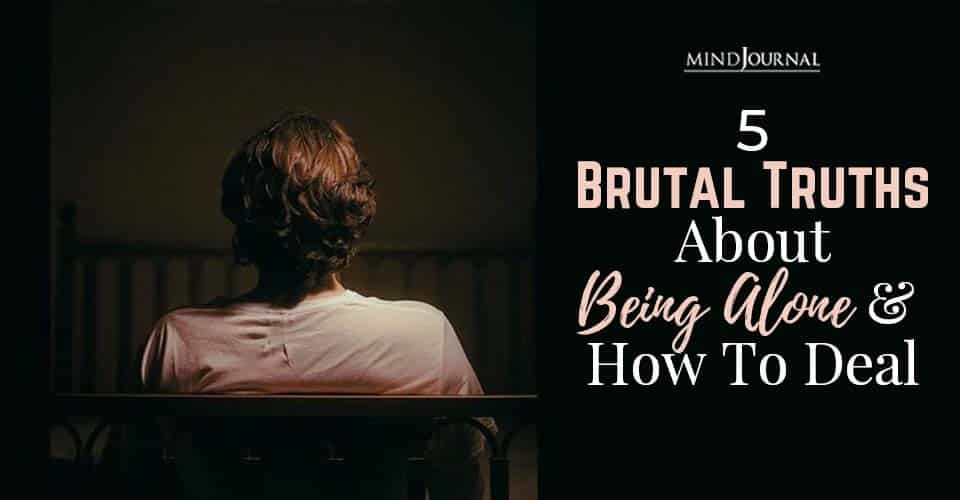Loneliness is a part of the human condition. Whether we are single or in a relationship, there are moments when we feel completely alone. We have been culturally conditioned to avoid loneliness because it brings with itself uncomfortable emotions like pain, grief, anxiety, powerlessness, or helplessness. Here’re truths about being alone that you didn’t know.
The thing is we have not been taught is that all these painful feelings constitute a part of the entire range of the human emotional spectrum and are a completely natural part of the human condition.
When we do not face our dark emotions, they do not go away; instead, they hide in our subconscious mind and become our shadow side.
It is only when we embrace all these painful emotions and face our shadow side, can we develop into well-rounded and evolved human being.
Read The Dark Side Of Loneliness
It is only when we embrace loneliness, can we turn it into a beautiful experience of solitude.
Here are 5 truths about being alone and how we can deal with loneliness:
1) Loneliness is a part of the human condition and we are alone, essentially in the things that are most important and intimate to us.
We all crave social connections. It is how we are wired. That’s why we have to develop skills to be interdependent and live in harmony with others.
But the paradox of human condition is that no matter how many connections we have, we still are an individual with our own boundaries and others are individuals with their own boundaries. We all have different tastes, preferences, belief systems and we are at different stages of evolution.
We cannot completely mesh or merge with the other.

There come times in our lives, like some sort of crisis, loss, transitions, or self-discovery journey, when we have to experience the fact that each one of us is alone on this journey, especially in the things that are most important and intimate to us.
These are areas where we have to walk alone and no one can walk these paths for us.
The feeling of loneliness in such situations can bring about uncomfortable emotions like pain, grief or anger but understanding the fact that we are on our own in these areas, we will be able to move through these painful emotions with resilience.
“We are unutterably alone, essentially, especially in the things most intimate and most important to us.” – Letters to a young poet, Rainer Maria Rilke.
2) Loneliness can turn into a vicious circle if you keep avoiding it
When loneliness hits us, it can bring with itself intense emotions of pain, anxiety, helplessness, and anger, and our first instinct is to avoid or numb our pain with distractions or addictions.
But avoiding loneliness through addictions or distractions is only like a band-aid that we put on our wound and it just locks us into a vicious circle.
Whenever the bout of loneliness hits us, our first instinct is to grab a drink or call a friend but we do not sit to face and feel the emotion. We think that the pain will be too much to bear and the negative emotions will stay forever.
But by suppressing our emotions, we are only making matters worse, they get stored in our bodies as negative energy.
The better approach to deal with the emotions is to face the emotion, feel it, breathe into the emotion and let it flow out of our body.
Read Feeling lonely? Blame it on your genes – Studies find Loneliness is a Heritable Trait
3) When you start facing loneliness, initially it may be full of struggle and pain

When we start facing loneliness, initially it might feel very painful and full of struggle. Why? Because when you are facing the reality of your life, it may just be full of painful insights.
But it is these insights that give us an opportunity to reflect and make corrective changes in our life.
If you keep going through the pain, instead of getting disheartened, it will become your greatest impetus for growth.
4) But once you start embracing loneliness, it can turn into solitude and become a catalyst for your success
Once we can embrace loneliness, it can turn into solitude. It is a beautiful opportunity to get to know ourselves better inside and out.
We become open to the most important relationship i.e. relationship with ourselves. We become more in tune with our intuition and open ourselves to the messages universe has in store for us.
Solitude is the place where you get creative ideas and insights. It is the secret recipe of success for a lot of ideators and visionaries.

5) Loneliness does not go away forever
Like we discussed, loneliness is an integral part of the human condition. One of the heartbreaking truths about being alone is that loneliness doesn’t go away forever.
It does not really go away fully. Once we learn to accept this fact and learn to face our loneliness, it becomes less and less frightening and loses its power over us.

In fact, it can become our ally and most beautiful companion.
Read Is It Solitude or Loneliness?: 4 Questions to Help You Tell
It is good to be solitary, for solitude is difficult; that something is difficult must be a reason the more for us to do it. – Rainer Maria Rilke
Enjoyed reading the truths about being alone?











Leave a Reply